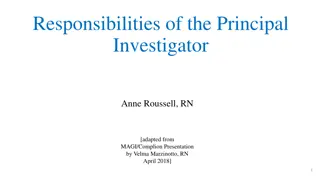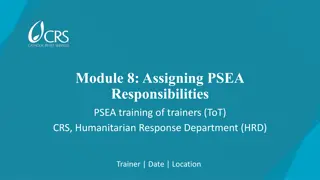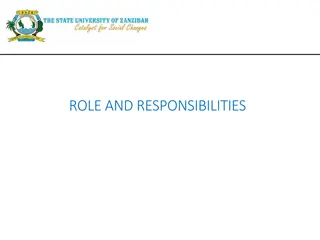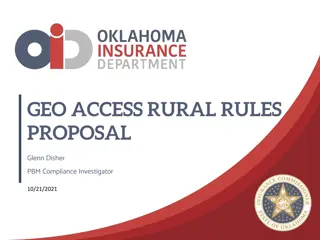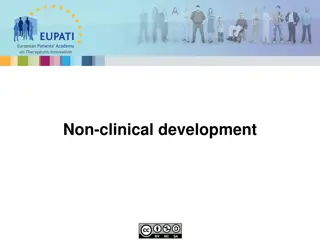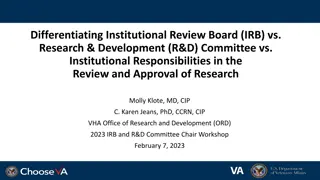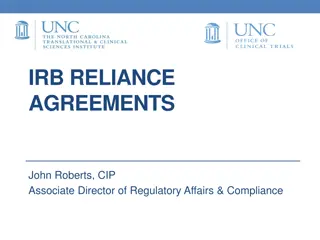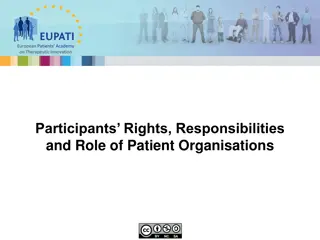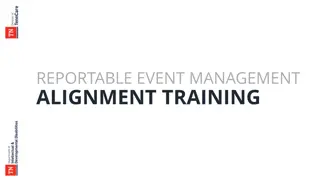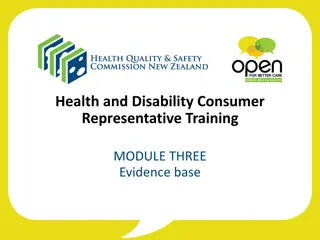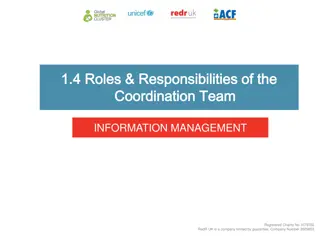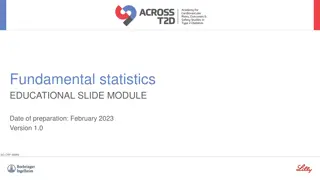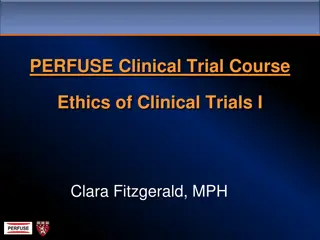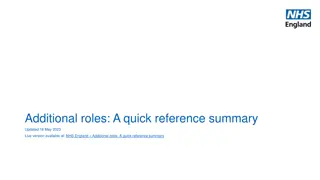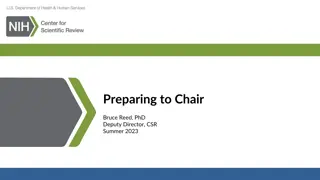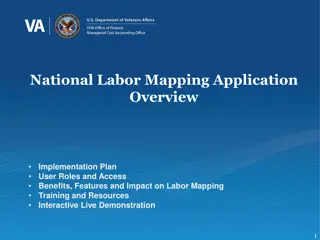Investigator Roles and Responsibilities in Clinical Research
Key responsibilities of investigators in clinical research involve ensuring participant safety, compliance with regulations, accurate data collection, and ethical conduct throughout the study process. Properly trained investigators play a crucial role in the success and integrity of clinical trials.
Download Presentation

Please find below an Image/Link to download the presentation.
The content on the website is provided AS IS for your information and personal use only. It may not be sold, licensed, or shared on other websites without obtaining consent from the author. Download presentation by click this link. If you encounter any issues during the download, it is possible that the publisher has removed the file from their server.
E N D
Presentation Transcript
Session 6: Roles and Responsibilities Derita: Margaret: mlynn@uthsc.edu dbran@uthsc.edu https://tnctsi.uthsc.edu/training-and-education/seminars- and-workshops/tn-ctsi-certification-exam-preparation- course/
Handout/Reference sheets: General Responsibilities of the Investigator NIH Delegation-Responsibilities FDA 1572 Form Worksheets: Roles and Responsibilities Study Guide Webinar to review: Research 101, session 5
21CFR Part 11 Regulations/Guidance 21 CFR Part 50 21 CFR Part 54 21 CFR Part 56 21CFR 312 21CFR 812 ICH GCP E6 (R2)guidance 45 CFR 46 FDA information Sheets OHRP Belmont Report Nuremburg Code Declaration of Helsinki Institutional Review Board (IRB) Protocol Institutional and Departmental policies and procedures ALCOA-C
Investigators Responsibilities Today s Session Sponsor s Responsibilities According to the following regulations and guidance ICH GCP E6 (R2) 21 CFR 312
Investigators Responsibilities According to ICH GCP E6 (R2)
An individual that conducts and has oversight of a research study May delegate tasks to qualified individuals Investigator means an individual who actually conducts a clinical investigation (i.e. , under whose immediate direction the drug is administered or dispensed to a subject) Investigator In the event an investigation is conducted by a team of individuals, the investigator is the responsible leader of the team "Subinvestigator" includes any other individual member of that team
The investigator(s) should be qualified by education, training, and experience to assume responsibility for the proper conduct of the trial, should meet all the qualifications specified by the applicable regulatory requirement(s), and should provide evidence of such qualifications through up-to-date curriculum vitae and/or other relevant documentation requested by the sponsor, the IRB/IEC, and/or the regulatory authority(ies) Investigator s Qualifications and Agreements The investigator should be thoroughly familiar with the appropriate use of the investigational product(s), as described in the protocol, in the current Investigator s Brochure, in the product information, and in other information sources provided by the sponsor
The investigator should be aware of, and should comply with, GCP and the applicable regulatory requirements Investigator s Qualifications and Agreements The investigator/institution should permit monitoring and auditing by the sponsor, and inspection by the appropriate regulatory authority(ies) The investigator should maintain a list of appropriately qualified persons to whom the investigator has delegated significant trial-related
The investigator should be able to demonstrate (e.g., based on retrospective data) a potential for recruiting the required number of suitable subjects within the agreed recruitment period Adequate Resources The investigator should have sufficient time to properly conduct and complete the trial within the agreed trial period The investigator should have available an adequate number of qualified staff and adequate facilities for the foreseen duration of the trial to conduct the trial properly and safely
Addendum If the investigator/institution retains the services of any individual or party to perform trial- related duties and functions, the investigator/institution should ensure this individual or party is qualified to perform those trial-related duties and functions and should implement procedures to ensure the integrity of the trial-related duties and functions performed and any data generated The investigator should ensure that all persons assisting with the trial are adequately informed about the protocol, the investigational product(s), and their trial related duties and functions The investigator is responsible for supervising any individual or party to whom the investigator delegates trial-related duties and functions conducted at the trial site
A qualified physician (or dentist, when appropriate), who is an investigator or a sub-investigator for the trial, should be responsible for all trial-related medical (or dental) decisions Medical Care of Trial Subjects During and following a subject s participation in a trial, the investigator/institution should ensure that adequate medical care is provided to a subject for any adverse events, including clinically significant laboratory values, related to the trial. The investigator/institution should inform a subject when medical care is needed for intercurrent illness(es) of which the investigator becomes aware
It is recommended that the investigator inform the subjects primary physician about the subject s participation in the trial if the subject has a primary physician and if the subject agrees to the primary physician being informed Medical Care of Trial Subjects Although a subject is not obliged to give his/her reason(s) for withdrawing prematurely from a trial, the investigator should make a reasonable effort to ascertain the reason(s), while fully respecting the subject s rights
Before initiating a trial, the investigator/institution should have written and dated approval/favorable opinion from the IRB/IEC for the trial protocol, written informed consent form, consent form updates, subject recruitment procedures (e.g., advertisements), and any other written information to be provided to subjects As part of the investigator s/institution s written application to the IRB/IEC, the investigator/institution should provide the IRB/IEC with a current copy of the Investigator s Brochure. If the Investigator s Brochure is updated during the trial, the investigator/institution should supply a copy of the updated Investigator s Brochure to the IRB/IEC Communication with IRB/IEC During the trial the investigator/institution should provide to the IRB/IEC all documents subject to review
The investigator/institution should conduct the trial in compliance with the protocol agreed to by the sponsor and, if required, by the regulatory authority(ies), and which was given approval/favorable opinion by the IRB/IEC. The investigator/institution and the sponsor should sign the protocol, or an alternative contract, to confirm agreement Compliance with Protocol The investigator should not implement any deviation from, or changes of, the protocol without agreement by the sponsor and prior review and documented approval/favorable opinion from the IRB/IEC of an amendment, except where necessary to eliminate an immediate hazard(s) to trial subjects, or when the change(s) involves only logistical or administrative aspects of the trial (e.g., change in monitor(s), change of telephone number(s))
The investigator, or person designated by the investigator, should document and explain any deviation from the approved protocol Compliance with Protocol The investigator may implement a deviation from, or a change in, the protocol to eliminate an immediate hazard(s) to trial subjects without prior IRB/IEC approval/favorable opinion. As soon as possible, the implemented deviation or change, the reasons for it, and, if appropriate, the proposed protocol amendment(s) should be submitted: (a) To the IRB/IEC for review and approval/favorable opinion; (b) To the sponsor for agreement and, if required; (c) To the regulatory authority(ies)
Investigational Product(s) Session 11
The investigator should follow the trials randomization procedures, if any, and should ensure that the code is broken only in accordance with the protocol Randomization Procedures and Unblinding If the trial is blinded, the investigator should promptly document and explain to the sponsor any premature unblinding (e.g., accidental unblinding, unblinding due to a serious adverse event) of the investigational product(s)
Informed Consent of Trial Subjects Sessions 15 and 16
Records and Reports Sessions 9 and 10
Safety Reporting Session 14
Final Report(s) by Investigator Session18
If the trial is prematurely terminated or suspended for any reason, the investigator/institution should promptly inform the trial subjects, should assure appropriate therapy and follow-up for the subjects, and, where required by the applicable regulatory requirement(s), should inform the regulatory authority(ies) Premature Termination or Suspension of a Trial If the investigator terminates or suspends a trial without prior agreement of the sponsor, the investigator should inform the institution, where applicable, and the investigator/institution should promptly inform the sponsor and the IRB/IEC, and should provide the sponsor and the IRB/IEC a detailed written explanation of the termination or suspension If the IRB/IEC terminates or suspends its approval/favorable opinion of a trial, the investigator should inform the institution where applicable and the investigator/institution should promptly notify the sponsor and provide the sponsor with a detailed written explanation of the termination or suspension
Investigators Responsibilities According to 21 CFR 312
An investigator is responsible for ensuring that an investigation is conducted according to the signed investigator statement, the investigational plan, and applicable regulations General Investigator s Responsibility protecting the rights, safety, and welfare of subjects under the investigator's care the control of drugs under investigation obtaining the informed consent of each human subject to whom the drug is administered
Investigational Product(s) Session 11
Investigators Record Keeping and Retention Investigator Reports Sessions 9 and 10
Assurance of IRB Review Session 5
Records and Reports Sessions 9 and 10
Inspection of Investigators Records and Reports Sessions 17
Handling of Controlled Substances Session 11
ICH GCP E6 (R2) Section 5 General Responsibilities of the Sponsor 21 CFR 312
Sponsors Responsibilities According to ICH GCP E6 (R2)
Organization or individual that funds, designs, collects, and analyzes data Often pharmaceutical, medical device, or biotechnical companies Sponsor Can also be an individual investigator Sponsor means a person who takes responsibility for and initiates a clinical investigation. The sponsor may be an individual or pharmaceutical company, governmental agency, academic institution, private organization, or other organization. The sponsor does not actually conduct the investigation unless the sponsor is a sponsor-investigator. A person other than an individual that uses one or more of its own employees to conduct an investigation that it has initiated is a sponsor, not a sponsor-investigator, and the employees are investigators
Sponsor-Investigator means an individual who both initiates and conducts an investigation, and under whose immediate direction the investigational drug is administered or dispensed Sponsor- Investigator The term does not include any person other than an individual The requirements applicable to a sponsor-investigator under this part include both those applicable to an investigator and a sponsor
The sponsor should: Quality Management implement a system to manage quality throughout all stages of the trial process focus on trial activities essential to ensuring human subject protection and the reliability of trial results
The design of efficient clinical trial protocols, tools, and procedures for data collection and processing, as well as the collection of information that is essential to decision making Quality Management The methods used to assure and control the quality of the trial should be proportionate to the risks inherent in the trial and the importance of the information collected All aspects of the trial are operationally feasible and should avoid unnecessary complexity, procedures, and data collection
Quality Management Using a risk-based approach: Critical Process and Data Identification during protocol development, the sponsor should identify those processes and data that are critical to ensure human subject protection and the reliability of trial results Risk Identification risks should be identified for critical trial processes and data. Risks should be considered at both the system level (e.g., standard operating procedures, computerized systems, and personnel) and clinical trial level (e.g., trial design, data collection, and informed consent process)
Risk Evaluation The sponsor should: Evaluate the identified risks, against existing risk controls by considering: (a) The likelihood of errors occurring (b) The extent to which such errors would be detectable (c) The impact of such errors on human subject protection and reliability of trial results Decide which risks to reduce and/or which risks to accept to evaluate risk control. The approach used to reduce risk to an acceptable level should be proportionate to the significance of the risk Risk reduction activities may be incorporated in protocol design and implementation, monitoring plans, agreements between parties defining roles and responsibilities, systematic safeguards to ensure adherence to standard operating procedures, and training in processes and procedures Predefined quality tolerance limits should be established, taking into consideration the medical and statistical characteristics of the variables as well as the statistical design of the trial, to identify systematic issues that can impact subject safety or reliability of trial results Detection of deviations from the predefined quality tolerance limits should trigger an evaluation to determine if action is needed
Risk Communication The sponsor should: document quality management activities Risk Communication /Risk Review communicate quality management activities to those who are involved in or affected by such activities, to facilitate risk review and continual improvement during clinical trial execution Risk Review The sponsor should: periodically review risk control measures to ascertain whether the implemented quality management activities remain effective and relevant, taking into account emerging knowledge and experience
Quality Assurance implementing and maintaining quality assurance and quality control systems with written SOPs to ensure that trials are conducted and data are generated, documented (recorded), and reported in compliance with the protocol, GCP, and the applicable regulatory requirement(s) securing agreement from all involved parties to ensure direct access to all trial-related sites, source data/documents, and reports for the purpose of monitoring and auditing by the sponsor, and inspection by domestic and foreign regulatory authorities Quality Assurance and Quality Control Quality Control should be applied to each stage of data handling to ensure that all data are reliable and have been processed correctly agreements, made by the sponsor with the investigator/institution and any other parties involved with the clinical trial, should be in writing, as part of the protocol or in a separate agreement
A sponsor may transfer any or all of the sponsor's trial-related duties and functions to a CRO, but the ultimate responsibility for the quality and integrity of the trial data always resides with the sponsor The CRO should implement quality assurance and quality control Contract Research Organization Any trial-related duty and function that is transferred to and assumed by a CRO should be specified in writing The sponsor should ensure oversight of any trial-related duties and functions carried out on its behalf, including trial-related duties and functions that are subcontracted to another party by the sponsor's contracted CRO(s) Any trial-related duties and functions not specifically transferred to and assumed by a CRO are retained by the sponsor
The sponsor should: designate appropriately qualified medical personnel who will be readily available to advise on trial-related medical questions or problems Medical Expertise if necessary, outside consultant(s) may be appointed for this purpose
The sponsor should utilize qualified individuals (e.g., biostatisticians, clinical pharmacologists, and physicians) as appropriate, throughout all stages of the trial process, from designing the protocol and CRFs and planning the analyses to analyzing and preparing interim and final clinical trial reports Trial Design
Maintain SOPs The SOPs should: cover system setup, installation, and use Addendum describe system validation and functionality testing, data collection and handling, system maintenance, system security measures, change control, data backup, recovery, contingency planning, and decommissioning
The responsibilities of the sponsor, investigator, and other parties with respect to the use of these computerized systems should be clear, and the users should be provided with training in their use Ensure that the systems are designed to permit data changes in such a way that the data changes are documented and that there is no deletion of entered data (i.e., maintain an audit trail, data trail, edit trail Addendum Maintain a security system that prevents unauthorized access to the data Maintain a list of the individuals who are authorized to make data changes Maintain adequate backup of the data Safeguard the blinding, if any (e.g., maintain the blinding during data entry and processing
Trial Management, Data Handling, and Recordkeeping Sessions 9 and 10
Records and Reports Sessions 9 and 10
The sponsor is responsible for selecting the investigator(s)/institution(s) Each investigator should be qualified by training and experience and should have adequate resources (see sections 4.1, 4.2) to properly conduct the trial for which the investigator is selected Investigator Selection If organization of a coordinating committee and/or selection of coordinating investigator(s) are to be utilized in multicenter trials, their organization and/or selection are the sponsor's responsibility Before entering an agreement with an investigator/institution to conduct a trial, the sponsor should provide the investigator(s)/institution(s) with the protocol and an up to- date Investigator's Brochure, and should provide sufficient time for the investigator/institution to review the protocol and the information provided


